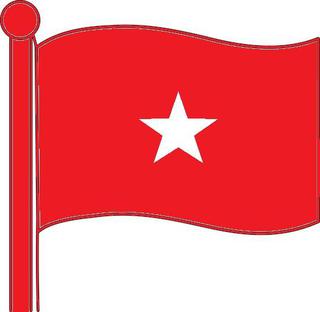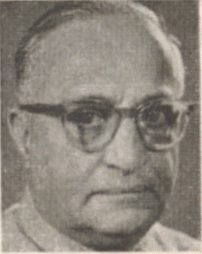Related Research Articles

Varahagiri Venkata Giri, better known as V. V. Giri was an Indian politician and activist who served as the fourth president of India from 24 August 1969 to 24 August 1974. He also served as the third vice president of India from 13 May 1967 to 3 May 1969. He was the first president to be elected as an independent candidate. He was succeeded by Fakhruddin Ali Ahmed as president in 1974. After the end of his full term, Giri was honoured by the Government of India with the Bharat Ratna in 1975. Giri died on 24 June 1980.

The Communist Party of India (CPI) is the oldest communist party in India. The CPI was founded in modern-day Kanpur on 26 December 1925.

Sir Richard Stafford Cripps was a British Labour Party politician, barrister, and diplomat.

Trade unions in India are registered and file annual returns under the Trade Union Act (1926). Statistics on trade unions are collected annually by the Labour Bureau of the Ministry of Labour, Government of India. According to the latest data released for 2012, there were 16,154 trade unions with a combined membership of 9.18 million, based on returns from 15 states out of a total of 28 states and 9 union territories. The trade union movement in India is largely divided along political lines and follows a pre-Independence pattern of overlapping interactions between political parties and unions. The net result of this system is debated, as it has both advantages and disadvantages. According to data submitted by various trade unions to the Ministry of Labour and Employment as part of a survey, INTUC, with a combined membership of 33.3 million, emerged as the largest trade union in India as of 2013.

Mysore State, colloquially Old Mysore, was a political territory within the Dominion of India and the subsequent Republic of India from 1947 until 1956. The state was formed by renaming the Kingdom of Mysore and Bangalore replaced Mysore as the state's capital. When Parliament passed the States Reorganisation Act in 1956. Mysore State was considerably enlarged when it became a linguistically homogeneous Kannada-speaking state within the Republic of India by incorporating territories from Andhra, Bombay, Coorg, Hyderabad, and Madras States, as well as other petty fiefdoms, It was subsequently renamed Karnataka in 1973.

Basawon Singh or Basawan Singh, also known as Basawon Sinha, was an Indian independence activist and a campaigner for the rights of the underprivileged, and industrial and agricultural workers.
Basudeb Acharia was an Indian Bengali-Tamil politician and a leader of the Communist Party of India (Marxist) political party. His ancestors were originally from Present-day Tamil Nadu, who settled in Bengal in 16th century. He considered himself to be a Bengali.
Mohammed Amin was an Indian politician from the Communist Party of India (Marxist), the largest communist party in India. He was a Vice President of the Centre of Indian Trade Unions.

The Bolshevik Party of India is an Indian political party in India. The party was founded in 1939. The party had a certain role in the trade union movement in West Bengal and was briefly represented in the state government in 1969. In later years the party has played a negligible role in Indian politics.

Cheppudira Muthana Poonacha was the Chief Minister of Coorg, Minister in Mysore State, Member of Parliament, Union Railway Minister of India and Governor of Madhya Pradesh and Governor of Orissa.
Vazhappady K. Ramamurthy or Vazhapadi K. Ramamoorthy was an Indian trade unionist and politician.

The second legislative assembly election for the Madras Presidency after the establishment of a bicameral legislature by the Government of India Act of 1935 was held in 1946. The election was held after 6 years of Governor's rule starting from 1939, when the Indian National Congress government of C. Rajagopalachari resigned protesting Indian involvement in World War II. This was the last election held in the presidency - after Indian independence in 1947, the presidency became the Madras state. The election was held simultaneously with that of the Legislative Council. The Congress swept the polls by winning 163 out of 215 seats. The years after this election saw factionalism in Madras Congress party with divisions across regional and communal lines. Competition among T. Prakasam, C. Rajagopalachari and K. Kamaraj resulted in the election of Prakasam as the prime minister initially. But he was later defeated by Omandur Ramaswamy Reddiar with Kamaraj's support. In turn, Reddiar himself was ousted to make way for P. S. Kumaraswamy Raja with the support of Kamaraj.
A communist front is a political organization identified as a front organization, allied with or under the effective control of a communist party, the Communist International or other communist organizations. It is a structure used by Communist and left-wing parties to intervene in broader political movements. They attracted politicized individuals who were not party members but who often followed the party line and were called fellow travellers.
K.S. Vasan was an Indian communist politician and trade unionist from the Kolar Gold Fields. who organized the first leftist trade union in the gold fields during the 1940s. Vasan, then a young man, arrived at the Kolar Gold Fields from Madras and went on to build a union that mobilized labourers from thirteen different mining companies. He was arrested as he led a workers revolt against the British authorities.
Vanguardism, in Leninist struggle, is a strategy where the most class-conscious members of the working-class, known as the revolutionary vanguard, lead institutions to advance communist goals.

Benjamin Francis Bradley (1898–1957) was a leading British communist and trade unionist who was accused of attempting to overthrow the British colonial authorities in India, leading to him being sentenced in the Meerut Conspiracy Trial. His imprisonment in 1929 provoked an enormous outcry, and in Britain, according to Stephen Howe, "probably inspired more left-wing pamphlet literature than any other colonial issue between the wars". He was also a key member of the Communist Party of Great Britain (CPGB).
Sachchidanand Vishnu Ghate, also known as S.V. Ghate, was a freedom fighter and first General Secretary of the Communist Party of India. The Communist Party of India Karnataka State headquarters, Ghate Bhavan, is named in his honor.

In 1964, a major split occurred in the Communist Party of India. The split was the culmination of decades of tensions and factional infighting. When India became independent in 1947, differences arose of how to adapt to the new situation. As relations between the Nehru government and the Soviet Union improved, a faction that sought cooperation with the dominant Indian National Congress emerged within CPI. This tendency was led by S.A. Dange, whose role in the party hierarchy became increasingly controversial. When the Sino-Indian War broke out in 1962 Dange's opponents within CPI were jailed, but when they were released they sought to challenge his leadership. In 1964 the party was finally divided into two, with the left faction forming the Communist Party of India (Marxist). The split had a lot of regional variations. It also impacted other organizations, such as trade union and peasant movements. The split has been studied extensively by scholars, who have sought to analyze the various domestic and international factors involved.
R.N. Upadhyaya was an Indian politician and trade unionist. He joined the Hindustan Socialist Republican Army in 1938. In 1940 he became a member of the Revolutionary Socialist Party. He participated in the August 1942 Quit India movement. He was jailed for his role in the independence struggle, and was released in 1946. He joined the Communist Party of India in 1952.
Mohan Punamia was an Indian trade unionist and politician. Punamia, then the Rajasthan secretary of the All India Trade Union Congress, was detained and jailed 1964-1965 under Defense of India Rules.
References
- 1 2 3 The Working Class. Centre of Indian Trade Unions. 1989. pp. 5, 8 – via Google Books.
- ↑
- Nair, Janaki (1994). "Contending Ideologies? The Mass Awakener's Union and the Congress in Mysore, 1936–1942" . Social Scientist. 22 (7/8): 42–63. doi:10.2307/3520152. JSTOR 3520152 . Retrieved 28 August 2020.
* Rakhahari Chatterji (1980). Unions, Politics, and the State: A Study of Indian Labour Politics. South Asian Publishers. p. 47 – via Google Books.
- Nair, Janaki (1994). "Contending Ideologies? The Mass Awakener's Union and the Congress in Mysore, 1936–1942" . Social Scientist. 22 (7/8): 42–63. doi:10.2307/3520152. JSTOR 3520152 . Retrieved 28 August 2020.